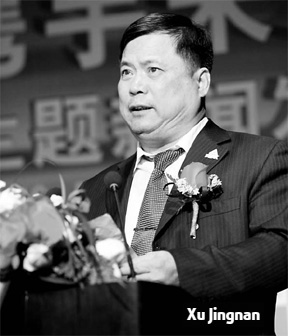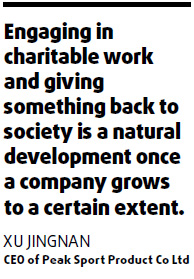

It ought to have come as a surprise to Xu Jingnan when his name found its way onto Forbes Chinese edition's 2009 China Charity List, as he never intended it to be there.
But Xu's reaction to this was characteristically understated, with the CEO of leading domestic sportswear brand Peak noting that charity is part and parcel of the firm's social responsibilities.
"Engaging in charitable work and giving something back to society is a natural development once a company grows to a certain extent," he said.

Fujian-based Peak has been actively engaged in social causes for many years. During the Yangtze flood of 1998, the firm donated 2.38 million yuan to the flood-hit area. It also established a 1-million-yuan fund in 2007 to improve living conditions in orphanages and old people's homes. With an initial donation of 10 million yuan, another charity fund was set up in the same year to provide educational and medical assistance to the poor and disabled.
Peak also took swift action when the nation was confronted by natural calamities last year. During the disastrous snowstorms in early 2008, the company offered clothing worth 5 million yuan to the worst-hit areas. And in the wake of the May 12 earthquake, Peak donated 1 million yuan in relief supplies.
As China, like the rest of the world, copes with the impact of the global financial crisis, Peak is doing its bit to help out. The sportswear manufacturer recently launched a 20-million-yuan program to help young people start their own businesses.
Humble beginnings
Xu, the company CEO, may now be a very wealthy man, but it hasn't always been like that for the Fujian man who literally pulled himself up by his bootstraps.
Talking about his humble beginnings, Xu said: "I started out pulling a handcart. I was earning around 2 yuan a day.
"At the time, I got familiar with a lot of customers, including many owners of small businesses," recalled Xu.
But he didn't just want to be friends with them, as he sought to learn as much as possible about how they can run their businesses, describing his method as "stealing operational skills and sharing resources".
Xu's first business involved recovering coal from the slag at a local mine. He used the coal to forge iron and make bricks.
Following his first successful foray into the world of business, Xu established factories engaged in packaging, brick manufacturing, crate processing and slipper production.
The 1980s witnessed the springing up of shoe and clothing factories in Xu's hometown of Quanzhou. Among these was Xu's plant, where he had been planning to make accessories for Nike. But disaster struck when the global sportswear giant pulled out of the deal.
Rather than admitting defeat, Xu decided to struggle on and build his own brand, retaining all of the staff meant to be working for the Nike venture.
After more than 10 years' hard work, Xu finally established Peak, which is now an international sportswear provider in its own right.

Peak's business grew by an annual average of 80 percent between 2005 and 2007, with the figure hitting 100 percent last year. Despite the economic slowdown, the firm, which became China's No 1 maker of basketball shoes by sales in 2007, has set its sights on a turnover of 3 billion yuan this year
Peak recently completed its third round of financing to the tune of $56.83 million from Silver Grant, Sequoia Capital China and Legend Capital.
But Xu said what was more important than the cash was the fact that the three strategic investors could enrich Peak's resources from different aspects.
"After Silver Grant became our shareholder, our credit in China Construction Bank (CCB) reached a record high; Sequoia Capital China helps our overseas sales with their online shopping websites; and Legend Capital shares its management experience with us," Xu said.
Key charity force
Private businesses have become a key force in China's charity sector. In the China Charity Ranking issued in April by China Philanthropy Times, 426 of the 899 companies that donated more than 1 million yuan were privately owned.
In 2008, up to 60 percent of the 80 billion yuan in donations to earthquake-hit areas was contributed by private firms.
For the Forbes 2009 China Charity List, the threshold for candidates has been raised from 1.02 million yuan in 2004, when it was carried out in China for the first time, to 11 million yuan. The 100 listed entrepreneurs and companies donated a total of 4.42 billion yuan in 2008, five times the figure in 2004.
(China Daily 06/08/2009 page8)













